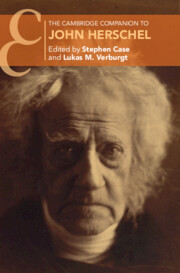Book contents
- The Cambridge Companion to John Herschel
- The Cambridge Companion to John Herschel
- Copyright page
- Contents
- Figures
- Contributors
- Acknowledgments
- Chronology
- Introduction
- 1 John Herschel
- 2 The Mathematical Journey of John Herschel
- 3 John Herschel’s Astronomy
- 4 Stargazer at World’s End
- 5 Herschel’s Philosophy of Science
- 6 Drawing Observations Together
- 7 Photology, Photography, and Actinochemistry
- 8 Herschel’s Planet
- 9 John Herschel and Scientific Standardization
- 10 John Herschel and Politics
- 11 John Herschel’s Methodology in the Scientific Community
- Further Reading
- Index
11 - John Herschel’s Methodology in the Scientific Community
Published online by Cambridge University Press: 08 May 2024
- The Cambridge Companion to John Herschel
- The Cambridge Companion to John Herschel
- Copyright page
- Contents
- Figures
- Contributors
- Acknowledgments
- Chronology
- Introduction
- 1 John Herschel
- 2 The Mathematical Journey of John Herschel
- 3 John Herschel’s Astronomy
- 4 Stargazer at World’s End
- 5 Herschel’s Philosophy of Science
- 6 Drawing Observations Together
- 7 Photology, Photography, and Actinochemistry
- 8 Herschel’s Planet
- 9 John Herschel and Scientific Standardization
- 10 John Herschel and Politics
- 11 John Herschel’s Methodology in the Scientific Community
- Further Reading
- Index
Summary
The Preliminary Discourse on the Study of Natural Philosophy, which Herschel published in Dionysius Lardner’s Cabinet Cyclopaedia series in 1830, can be a difficult book to interpret.1 As commentators have emphasized, its content and the circumstances of its publication indicate it is perhaps better understood not (or at least, not merely) as a technical treatise on scientific inference and methodology but rather in the tradition of “conduct manuals,” a popular genre that offered readers insight into how they might elevate and refine their character.2 The Preliminary Discourse invokes not just prescriptions for scientific practice but also the epistemic and personal virtues of a good scientist and even (perhaps especially) the merits of careful observation and the study of science for the layman.3 Science, Herschel writes, is exceptional in “filling us, as from an inward spring, with a sense of nobleness and power which enables us to rise superior to” the circumstances of our lives.4 The Preliminary Discourse was printed and bound inexpensively, widely sold, and frequently reprinted.5 Given its history, it seems likely that philosophers of science have been too quick in reading this work primarily through the lens of its contributions to the epistemology of science.
- Type
- Chapter
- Information
- The Cambridge Companion to John Herschel , pp. 257 - 279Publisher: Cambridge University PressPrint publication year: 2024



